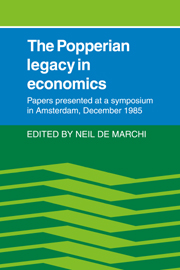Book contents
- Frontmatter
- Contents
- Preface
- List of contributors
- Introduction
- Discussion
- Part I Popper as a philosopher of science
- 1 An appraisal of Popperian methodology
- 2 The natural order
- Part II Popper among the economists
- Part III Falsification and trying to do without it
- Part IV The missing chapter: empirical work and its appraisal
- Part V Non-Popperian perspectives on economics
- Index
2 - The natural order
Published online by Cambridge University Press: 05 January 2012
- Frontmatter
- Contents
- Preface
- List of contributors
- Introduction
- Discussion
- Part I Popper as a philosopher of science
- 1 An appraisal of Popperian methodology
- 2 The natural order
- Part II Popper among the economists
- Part III Falsification and trying to do without it
- Part IV The missing chapter: empirical work and its appraisal
- Part V Non-Popperian perspectives on economics
- Index
Summary
Science and art
Do economic theories propound laws that describe how events occur, or do they contain rules showing how we must behave? It is an old question. In the nineteenth century, when economics was still called “political economy,” the practitioners compromised by that name asked themselves: Are we occupied with a science teaching us how we do it or with an art teaching us how we must do it? In the introductory chapter of the book devoted to the principles of political economy, they often represented themselves as research scientists, curious about the way the world is made up. But anyone who read on could also discover how they designed a blueprint for changing the world.
Adam Smith had left no doubt about the latter. He too had come under the spell of the idea proclaimed by John Locke: The laws of nature do not really differ from the moral laws by which man should behave and society must be ordered. They both relate to the natural order desired by God. Smith, impressed by Descartes and Newton, regarded society expressly as one large mechanism, the operation of which can be explained by reasoning and observing with the aid of a small number of principles, but in line with ideas of Shaftesbury and his teacher Hutcheson, he also devoted attention to the world's beauty.
- Type
- Chapter
- Information
- The Popperian Legacy in EconomicsPapers Presented at a Symposium in Amsterdam, December 1985, pp. 87 - 118Publisher: Cambridge University PressPrint publication year: 1988
- 9
- Cited by



